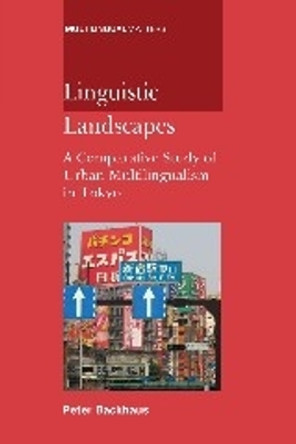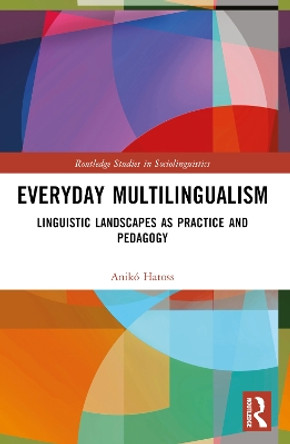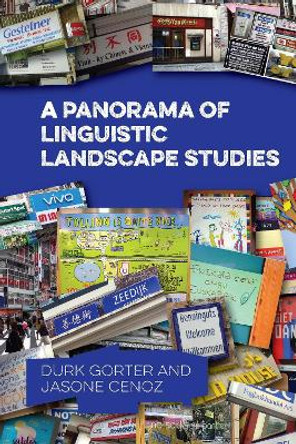Description
Linguistic Landscapes is the first comprehensive approach to a largely under-explored sociolinguistic phenomenon: language on signs. Based on an up-to-date review of previous research from various places around the world, the book develops an analytical framework for the systematic analysis of linguistic landscape data. This framework is applied to a sample of 2,444 signs collected in 28 survey areas in central Tokyo. Analytical categories include the languages contained and their combinations, differences between official and nonofficial signs, geographic distribution, availability of translation or transliteration, linguistic idiosyncrasies, and the comparison of older and newer signs, among others. Combining qualitative and quantitative methods, the analysis yields some unique insights about the writers of multilingual signs, their readers, and the languages and scripts in contact. Linguistic Landscapes thus demonstrates that the study of language on signs has much to contribute to research into urban multilingualism, as well as the study of language and society as a whole.
About the Author
Peter Backhaus is research fellow at the German Institute for Japanese Studies, Tokyo. His research interests include sociolinguistics, semiotics, writing, and Japanese linguistics. He has published various papers about linguistic landscape research, including 'Signs of multilingualism in Tokyo: A diachronic look at the linguistic landscape' (International Journal of the Sociology of Language 175/176, 2005) and 'Multilingualism in Tokyo: A look into the linguistic landscape' (International Journal of Multilingualism 3.1, 2006). At present he is preparing a publication about Japan's linguistic landscape (with Florian Coulmas and Hiroshi Shoji).
Reviews
This book offers an authoritative, engaging, and well-illustrated introduction to LL research and has the merit of providing a rich, diversified, and comprehensive review of previous studies within this rather new area of investigation. The study of the LL of Tokyo contributes to advancing our understanding of LL as an interdisciplinary field of investigation, and helps to stimulate and map future research ventures in this area of inquiry within language policy and planning. Backhaus's innovative approach to the examination and analysis of LL data could provide further insights to academics, researchers and graduate students interested in LL research. It is suitable for general audiences as well, owing to the face that it is relatively easy to read and does not presuppose expertise in any particular linguistic area.
-- Selim Ben Said * Lang Policy, Published Online: 10 April 2008 *"This is a very nice work that will certainly be a reference book. It contains an impressive state-of-the-art review of a young field which, however, is a very dispersed and attract people from very different places and perspectives. Hence, it is a kind of tour de force to bring all the material and approaches together and discuss them in a same general framework. Moreover, this is also a very illuminating case study about linguistic landscape in one major city of this world, namely Tokyo. The research is led with brio and with rigor and reveals a rich reality that certainly merits much thinking....I think that this is a real masterpiece of linguistic landscape study. This is as such a genuine contribution to this field. "
-- Report by Eliezer Ben-Rafael, Tel-Aviv UniversityIn this study of the linguistic landscape of Tokyo Peter Backhaus clearly demonstrates that Japan is not as linguistically homogeneous as is commonly thought. His fascinating account is based on a large empirical database of multilingual signs He describes in detail the increasing importance of English as well as other languages. His book proves that the study of the linguistic landscape is a valuable new development in the analysis of multilingualism around the world.
-- Durk Gorter, Professor of Frisian sociolinguistics, Universiteit van Amsterdam/Fryske AkademyBackhaus's volume is a welcome contribution not only to the study of linguistic landscapes and landscaping, but also to language contact and multilingualism in Japan. Linguistic Landscapes is clearly structured, well written and requires little or no prior theoretical knowledge of linguistic landscape issues.
-- Mark Irwin, Yamagata University, Japan * Linguist List 19.1760 *This book is a welcome and useful addition to the study of LL, particularly for its contribution of well needed empirical studies. The research on Tokyo's LL is precise in its definition and classification of empirical analysis, well-informed with regards to all categories analyzed and methodically thorough. It is commendable that Backhaus uses both qualitative and quantitative methods in such detail in his research of Tokyo's LL. This comparative study on language on signs is a valuable contribution to the field of multilingualism and language contact research.
-- Anastassia Zabrodskaja * SKY - Journal of Linguistics (the annual journal of The Linguistic Association of Finland, Suomen Kielitieteellinen Yhdistys) *Book Information
ISBN 9781853599460
Author Peter Backhaus
Format Paperback
Page Count 168
Imprint Multilingual Matters
Publisher Channel View Publications Ltd
Weight(grams) 266g
Dimensions(mm) 234mm * 156mm * 10mm






